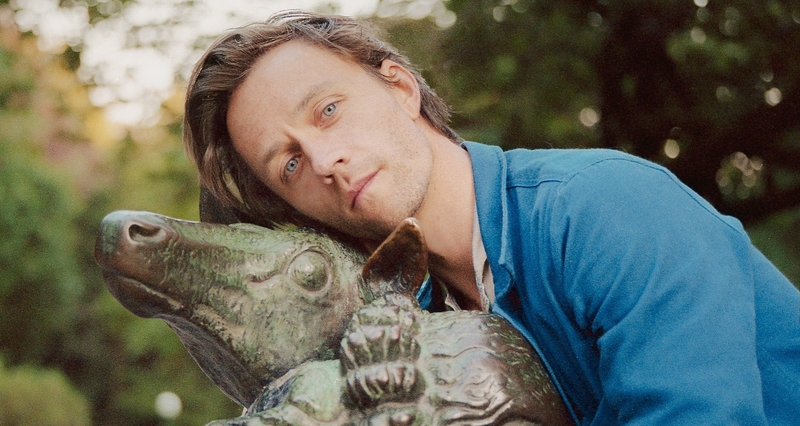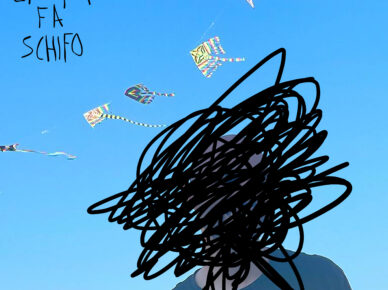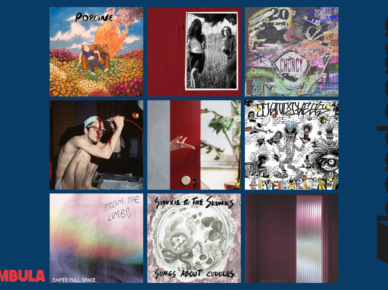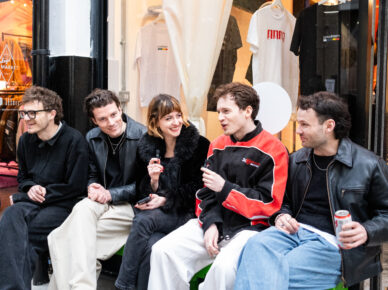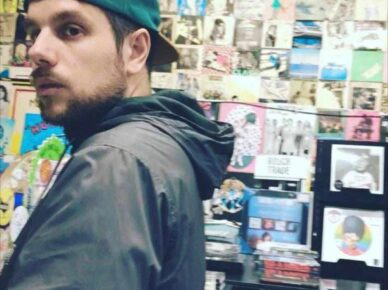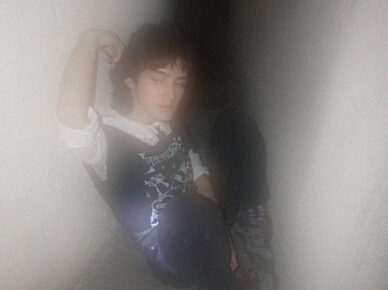In vista del suo imminente ritorno in Italia, abbiamo fatto una piacevole chiacchierata col cantautore norvegese.
Sondre Lerche è uno degli artisti più eclettici e prolifici apparsi negli ultimi anni sulla scena internazionale. L’artista norvegese (ma stabilitosi ormai da anni negli USA, prima a Brooklyn, ora a Los Angeles) vanta una discografia ricca e variegata, dall’acclamato debutto del 2001 con Faces Down fino al nuovissimo Avatars of Love, uscito lo scorso 1 aprile per PLZ / InGrooves.
In occasione dell’unica data italiana prevista nel suo tour europeo (in programma il prossimo 19 aprile al Biko di Milano e prodotta da BPM Concerti), abbiamo avuto il piacere di rivolgergli qualche domanda su passato e futuro della sua carriera da artista e sullo stato attuale della musica in generale.
[ ITA ]
La tua è ormai una carriera ventennale, costellata da molti album e svariate collaborazioni (oltre che da colonne sonore per film di successo, vedi quella per “Dan in Real Life”): cosa rimane oggi del Sondre Lerche di vent’anni fa? In che modo il ricco bagaglio di esperienze e di ascolti accumulato finora ha contribuito a plasmare l’artista che sei oggi?
È un’ottima domanda. Penso che crescere equivalga a rivalutare costantemente il mondo, e a cambiare idea su cose che conoscevi più che altro in teoria, o almeno da un’unica prospettiva. Col passare del tempo, la speranza è quella di imparare a guardare la vita da molteplici prospettive, anche attraverso un maggiore sviluppo della propria empatia.
Sento che il fatto di scrivere canzoni con maggiore empatia rispetto al passato possa essere il più grande cambiamento per me: sebbene continui a scrivere partendo dalla mia prospettiva personale, sono più interessato alle varie sfaccettature, a penetrare più in profondità nelle emozioni. Sto provando a guardare dentro di me. Scrivere canzoni e produrre musica da poter condividere con il mondo è un qualcosa che occupa una parte davvero importante nella mia vita, è ciò che ho sempre voluto fare, e mi sembra incredibile il fatto di poter avere questa opportunità da ormai venti anni.
Mi sento orgoglioso nel poter affermare di aver sempre fatto quello che volevo e di cui sentivo di avere bisogno, e i miei lavori sono il risultato di tutto questo.
Già dai primi singoli pubblicati e dal minutaggio corposo (un doppio album per oltre 90 minuti complessivi di durata) appare chiaro che Avatars of Love sia uno dei lavori più ambiziosi della tua carriera: qual è la genesi di questo disco? E perché la scelta insolita e coraggiosa di pubblicare un album di tale durata in un periodo storico in cui la maggior parte degli artisti tende a ridurre sempre di più le tracklist dei propri album, onde evitare che l’attenzione del pubblico cali durante l’ascolto?
Questo disco non era stato previsto, è arrivato come una sorta di esplosione interna a me. I testi richiedevano una lunghezza dei brani maggiore, e i brani avevano bisogno proprio di quel tipo di unità, di stare insieme. Ho provato a dividere l’album in due uscite separate, ma non sembrava funzionare. Quindi mi sono limitato ad assecondare il mio lavoro e le mie intuizioni. Era l’unico modo possibile per far sì che il disco risultasse sincero e apprezzabile.
Abbiamo letto che a marzo 2020 eri tornato in Norvegia per poi restare bloccato lì a causa della pandemia: come hai vissuto quel periodo di isolamento lontano dai palchi e dagli USA? Ha influito in qualche modo sulla tua scrittura?
Ero tornato a casa in Norvegia pieno di energia ed eccitazione e col desiderio che il progetto per il disco che stavo per pubblicare, Patience, non svanisse durante la pandemia. Così, mentre tutti entravamo in lockdown, ho provato a cercare modi per continuare a relazionarmi con il mio pubblico tramite concerti in streaming e video fino ad arrivare, nell’estate del 2020, a guidare da solo per le strade norvegesi per fare concerti col distanziamento sociale.
Quell’estate ho fatto cinquanta concerti. Per me ha rappresentato un modo per andare avanti e non cadere nella depressione e nell’oscurità. Avevo bisogno di viaggiare e di condividere l’album a cui avevo così duramente lavorato. E quando Patience è uscito, ho semplicemente continuato a scrivere e registrare brani tra un concerto e l’altro.
Avatars of Love è un album infarcito di featuring: dalle CHAI a Mary Lattimore, da Aurora a Felicia Douglass dei Dirty Projectors, sono tanti i musicisti che vi hanno preso parte. Quanto è importante per te collaborare con gli artisti più disparati? È un modo per arricchire il tuo sound e renderlo ancor più variegato e caleidoscopico?
Per questo album volevo semplicemente aprire le finestre del mio studio e mettermi in contatto col mondo. In un certo senso era un qualcosa di simbolico. L’ho fatto una volta finite le registrazioni, proprio prima di completare il tutto, per donare nuova luce e colori diversi ai brani. Sentivo il bisogno di voci e istinti diversi per chiudere in bellezza il lavoro!
In precedenza abbiamo accennato a quanto sia difficile oggigiorno riuscire ad attirare l’attenzione di un pubblico musicale sempre più evanescente e virtuale: secondo la tua esperienza, in che modo le piattaforme di streaming hanno cambiato il modo di fare musica da parte degli artisti? Quanto ti senti “costretto” a produrre musica pur di restare sulla mappa, in un’epoca in cui escono centinaia e centinaia di nuovi dischi ogni anno?
Non è un qualcosa a cui presto attenzione quando produco la mia musica. Quando scrivo un brano e lo registro, l’unica cosa su cui mi concentro è fare ciò che mi piace, non penso al pubblico e certamente non penso alle piattaforme di streaming. Semplicemente creo ciò che voglio sentire.
Se c’è una cosa su cui la pandemia ha influito in maniera pesantissima è stata la musica dal vivo: di fatto per quasi due anni non c’è stata possibilità di assistere a concerti, con gravi ripercussioni per artisti, proprietari di locali e agenzie che lavorano nel settore. Quanto è stato difficile stare per così tanto tempo lontano dai palchi, non potendo così portare la tua musica nella sede ad essa più congeniale?
Come detto in precedenza, grazie al fatto di poter suonare ovunque da solo sono stato in grado di trovare delle vie per tenermi attivo e in contatto col mio pubblico in Norvegia. E quella è stata una cosa molto importante per me, per continuare ad andare avanti. Non volevo proprio starmene seduto in casa a guardare Netflix. Ovviamente è stato impegnativo, ho anche dovuto improvvisare un sacco e lavorare molto duramente. Ed è una cosa che non avrei potuto fare se fossi rimasto negli Stati Uniti, e sono grato di averlo potuto fare in Norvegia.
Per il resto, il periodo del lockdown è stato incredibilmente pesante per tecnici, agenzie di booking, musicisti e per tutte quelle persone che lavoravano nel mondo della musica e che non avevano opportunità di fare altro. Molti di loro hanno cambiato lavoro e non torneranno indietro. È una perdita terribile.
Sono ormai passati un po’ di anni dall’ultima volta che hai suonato in Italia: qual è il tuo rapporto col nostro Paese? Hai ricordi particolari sulle tue esperienze italiane passate? E che idea hai del pubblico italiano, a livello di partecipazione, calore ed attenzione?
Amo l’Italia, ho ricordi davvero piacevoli di concerti suonati da voi. Ho imparato ad apprezzare la fantastica gastronomia italiana, e sento che la mia musica viene recepita molto bene nel vostro paese. Ho anche dato vita ad un marchio di vini naturali, “PATOS”, e quest’anno metterò in commercio due vini italiani prodotti insieme a dei fantastici produttori del vostro paese. Uno insieme a Frank Cornelissen, sull’Etna, e un pinot nero frizzante insieme a Casa Belfi, nel nord.
E adesso la domanda più scontata di tutte, ma altrettanto inevitabile: progetti per il futuro? Altri dischi in programma? Collaborazioni particolari? Soundtrack da curare?
Ho dei progetti davvero stimolanti ma altrettanto segreti, e adesso che l’album è uscito ho intenzione di riposarmi un po’. Non vedo l’ora di andare in tour, ma ad oggi non ho alcuna fretta di fare un altro doppio album!
LINK
Sito web
Facebook
Instagram
Bandcamp
BIGLIETTI
martedì 19 aprile 2022 @ Biko – Milano [ Ticketone ]
[ ENG ]
Yours is now a twenty-year old career, studded with many albums and various collaborations (as well as soundtracks for successful films, see the one for “Dan in Real Life”): what remains today of the Sondre Lerche from twenty years ago? How has the wealth of experience and audience gathered so far contributed to shaping the artist you are today?
That’s a great, big question. I think growing is constantly reevaluating the world, and changing your mind about things you knew mostly in theory, or from only one perspective. With time, we hopefully learn and experience life from many perspectives, expanding our empathy.
I feel that may be the biggest change for me, that I write songs with greater empathy, even though I am writing from my very personal perspective, I am more interested in every angle, and insight into the emotion. I am trying to see through myself. Creating songs and making music that I share with the world is a very big part of my life, it’s what I always wanted to do, so it feels wild to have been allowed to do it for 20 years.
I am proud to say that I have always only done exactly what I wanted and needed, and the result is my body of work.
Starting from the first singles released and the full-bodied minutes (a double album for over 90 minutes) it is clear that Avatars of Love is one of the most ambitious works of your career: what is the genesis of this record? And why the unusual and brave choice of releasing an album of such duration in a historical period in which most artists tend to reduce more and more the tracklists of their albums, in order to avoid that the public’s attention drops while listening?
This album was not planned, it just exploded out of me. The lyrics demanded the songs be longer, and the songs demanded to exist together. I tried dividing it into two seperate album releases, but it didn’t feel good. So I just had to obey the work and my own intuition. It just needed to be this way for it to feel true and good.
We read that in March 2020 you returned to Norway and then remained stuck there due to the pandemic: how did you experience that period of isolation away from the stages and from the US? Did it affect your writing in any way?
I returned home to Norway with a lot of energy and excitement and desire to make sure the album I was about to release, Patience, didn’t just vanish amid the pandemic. So when everybody else was going into lockdown, I started trying to find ways of still connecting with audiences, via streaming concerts, videos, and eventually, during the summer of 2020, driving alone across Norway playing socially distanced shows for however many people was allowed and safe.
I did 50 shows that summer. It was a way for me to survive and not become depressed and dark. I needed to be moving and sharing that album that I had worked so hard on finishing. And when Patience came out I just kept on going, writing and recording in between shows and all the activity.
Avatars of Love is full of featurings: from CHAI to Mary Lattimore, from Aurora to Felicia Douglass of the Dirty Projectors, many musicians took part in it. How important is it for you to collaborate with the most various artists? Is it a way to enrich your sound and make it even more varied and kaleidoscopic?
On this record I just wanted to open up the windows of the studio and reach out to the world. It was symbolic in a way. I did it at the end of the recording, to get new light and color to the songs, right before completing the album. I needed other voices and instincts to top it off!
We previously mentioned how difficult it is nowadays to attract the attention of an increasingly evanescent and virtual musical audience: according to your experience, how streaming platforms have changed the way artists make music? How much do you feel “forced” to produce music in order to stay on the map, in an era where hundreds and hundreds of new records are released every year?
It’s not something I think about when I make the music. When I write a song and record it, I am only interested in what makes me excited, I don’t think about the audience and I certainly don’t think about streaming platforms, haha. I just create what I need to hear.
If there is one thing the pandemic has had a huge impact on, it was live music: for almost two years there was in fact no opportunity to attend concerts, with serious repercussions for artists, club owners and agencies working in this field. How difficult was it to stay away from the stages for so long, not being able to bring your live music to the public?
As I said, I was able to find ways of staying active and in contact with audiences in Norway because I could perform anywhere solo. And that was a really important thing for me, to keep moving. I really didn’t want to sit still at home and watch Netflix. It was challenging of course, and it required me to improvise a lot, and work hard as hell. And it’s not something I could’ve done if I stayed in the US, so it was a possibility I saw in Norway, that I was grateful for.
But it’s been incredibly hard for a lot of stage crew, booking companies, musicians and people you don’t see on stage who have had no way of working. A lot of them have moved on to other jobs, and they are not coming back. That’s a great loss.
A few years have now passed since you last played in Italy: what is your relationship with our country? Do you have some special memories of your past Italian experiences? And what is your idea of the Italian public, in terms of participation, warmth and attention?
I love Italy, I have some very fond memories playing shows, and also falling in love in Italy. I learned to appreciate great food and wine in Italy, and I feel my music is understood well in Italy. I have also started a natural wine brand, “PATOS”, and this year I am launching two Italian wines produced together with amazing Italian wine makers. One with Frank Cornelissen in Etna, and a sparkling pinot noir with Casa Belfi up north.
And now the most obvious question of all, but equally inevitable: projects for the future? Other discs in the program? Special collaborations? Soundtrack to be cured?
I have some very exciting but very secret projects, and am going to take some time to rest now that this album is out. I am excited to tour, but in no hurry to make another double album right now!
SEGUICI
Sito web • Facebook • Instagram • Twitter • Spotify
Art Pop avatars of love biko milano bpm concerti Cantautorato concerto indie pop Intervista Norvegia sondre lerche Soundtrack tour 2022
Last modified: 14 Aprile 2022

